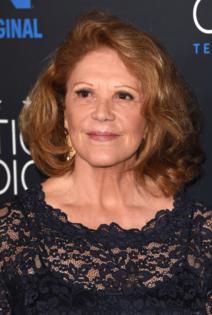Appreciation: For 50 years, Linda Lavin was TV's go-to touch of class
Published in Entertainment News
When Linda Lavin appeared on the doorstep of Lisa Kudrow and Ray Romano as a nosy neighbor in Netflix's new real estate comedy "No Good Deed," my first thought was, "Linda Lavin looks great," which quickly segued into the feeling that it was just good to see her again. (You never had to wait too long to see her again; she worked a lot.) It was a small but vital part, in which she seemed vital and anything but small.
So it was with some surprise that I learned the news that Lavin had died Sunday at age 87. Not that she seemed 87; there seemed to be no reason to think she couldn't go on forever. Indeed, she had completed seven episodes of a new Hulu series, "Mid-Century Modern," in which she plays the mother of Nathan Lane, who moves into her Palm Springs home with friends Matt Bomer and Nathan Lee Graham.
It was "Alice," the 1976 CBS sitcom adaptation of Martin Scorsese's "Alice Doesn't Live Here Anymore" — the only situation comedy that will ever be made from a Scorsese film — that made Lavin a star. But she was already a cherished figure on the New York stage when she moved to Hollywood in 1973 with first husband, the actor Ron Leibman, with a Tony nomination for Neil Simon's "Last of the Red Hot Lovers." She'd appeared in plays by Carl Reiner, Jules Feiffer and John Guare and in Paul Sills' "Story Theater." (In the late '50s, she was a member of Sills' improvisational Compass Players, which would give birth to Second City.) In "The Mad Show," she introduced "The Boy From ...," a "Girl From Ipanema" parody co-written by Stephen Sondheim. New York Times critic Stanley Kauffmann called her performance in the 1966 "It's a Bird ... It's a Plane ... It's Superman" "pure imp": "I wish she were in every musical and revue."
In "Alice," Lavin plays the title character, a widowed single mother relocating from New Jersey to Los Angeles to relaunch a singing career, who winds up a waitress near Phoenix after her car breaks down on the way. The star occupied a relatively straight role amid a cast of oddballs: the outrageous Flo (Polly Holliday), whose catch phrase "Kiss my grits" was a meme in its day; the mousy Vera (Beth Howland); and Vic Tayback, repeating his role from the film, as loud but lovable Mel, in whose diner Alice settles in for a nine-season, 202-episode run.
It was a comedy about working women, in the decade of the women's movement — Norman Lear's "One Day at a Time," about a single mother and her daughters getting by, premiered the year before. As Alice, Lavin projects a certain solidity not distinct from a certain sexiness; she's Rosie the Riveter with a line of plates balanced on her arm. No pushover.
Her voice had a penetrating edge — one thinks of New York, though she was not by birth a New Yorker — she could modulate when the part required, but whatever the character Lavin spoke with a stage actor's precision. She could be sweet, evil, overbearing, put-upon, thoughtful, impulsive, girlish, vulnerable or manipulative and superimpose selected qualities for extra complexity, always with a compressed energy, obvious or veiled. Lavin was the grandchild of Russian immigrants, and in later years she often played variations on the Jewish mother — lower class, middle class, upper class. Standing in for Simon's own in "Broadway Bound" finally earned her a Tony Award in 1987.
Lavin belonged to the stage and screen, and to their attendant communities, in equal measures, in a way rare for American actors; there were times she concentrated on one to the exclusion of the other, and times when she alternated between them, but never with lessening prestige. She might have worked less or more at times and moved between starring, recurring and guest roles, but there was no downhill slope to her career. (She stayed busy in the pandemic with a very funny Web series, "Yvette Slosch, Agent," in which she misguidedly guides the career of jazz violinist Aaron Weinstein.) She was a great lady of the theater, in a down to earth way; on television, her mere presence lent a production class, however much class her character might lack.
The series in which she starred after "Alice" were, like most, short-lived; all were multicamera network shows, tailor-made for a theater person, the equivalent of putting a play on its feet week after week. "Room for Two" (ABC, 1992) paired her with screen daughter Patricia Heaton, whose New York TV morning show she joins as a quirky commentator. In "Conrad Bloom" (NBC, 1998) and again in "9JKL" (CBS, 2017), she was cast as the mother to characters played by Mark Feuerstein. In the former, she is glamorous and gets to sing a verse of "Steam Heat" and dance a little. (Lavin, who sang the "Alice" theme, also had a cabaret act.) In the latter, Feuerstein lives in an apartment between his parents — Elliott Gould played Lavin's husband — and his brother's family, failing to establish boundaries. Throughout her career, Lavin did not so much enter a scene as sweep into it.
She was mom again, to Sean Hayes, in "Sean Saves the World" (NBC, 2013-14). There were roles in Chuck Lorre's kidney donor sitcom "B Positive" as a sparky resident of an assistant living facility, and "Santa Clarita Diet" (Netflix, 2017) as a senior brought back to life, in an undead, zombified way. You could find her there, blood smeared around her mouth, sharing a lunch of human with Drew Barrymore. None were bad, but that is almost beside the point. She was great in them all.
_____
©2024 Los Angeles Times. Visit latimes.com. Distributed by Tribune Content Agency, LLC.













Comments